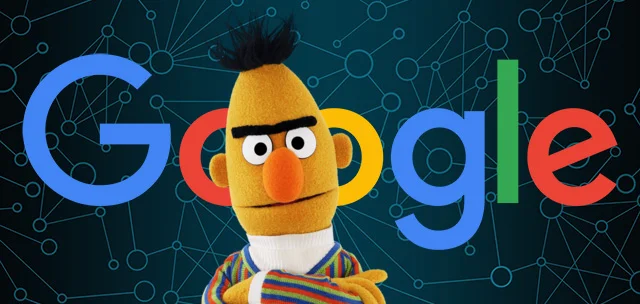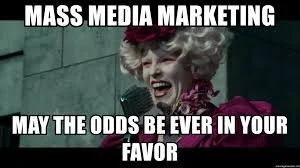THE STRATEGY SERIES: WHAT BERT MEANS FOR YOUR MARKETING
As many of you know, I LOVE digital marketing. I am passionate about every facet; from using data to setting up your website for crawlers to strategies that outwit and outsmart your competition to how developments in technology present new opportunities for marketers. The digital landscape is like the Hunger Games with a side of Survivor and a dash Big Bang Theory, bazinga!
Many of you will have heard about Google’s new AI, BERT. If you haven’t, don’t stop reading because there are big implications for your business. Last year Google introduced and open-sourced a neutral-based technique for natural language processing (NLP) for its Bidirectional Encoder Representations from Transformers, aka BERT. I know you love it when I talk nerdy to you but stay with me. BERT is a piece of technology that enables ANYONE to train their own state-of-the-art question answering system. Think - how consumers queries allow them to find your business.
Google sees billions of searches every day. Of those searches, 15% are queries Google has NOT seen before. Meaning, Google returns search results that don’t answer the consumers curiosity. Furthermore, do you ever search something and are provided search results that do not answer the question? Google also knows that generations use the search provider differently. For example, my superhero mother likes to ask the ‘Google Machine’ full questions. My sister, a cusper Gen X/Millennial, uses a phrase and I (millennial) put ‘keyword-ese’ into the search bar or into YouTube (remember, Google owns YouTube). However, my Gen Z friends are more likely to use YouTube to research something, not Google (this is a flag incase you didn’t see).
There are three types of queries people usually make when performing a search: Informational, Navigational, Transactional. Search is about understanding language based on the aforementioned. It is a marketer’s job to figure out what our consumers are searching and use our sites to surface information that renders in key positions on Google. Historically we have baked keywords into text on our sites and made the consumer read to find the answer. I would now challenge you to reconsider this approach. With BERT, the system processes words in relation to all the other words in a sentence, rather than the order of the words. For example take this query, ‘Winter vacation packages to ski resorts in Colorado.’ Previously emphasis would not have been placed on the word ‘to’ and its relationship to other words in the query. BERT grasps the nuance that the word ‘to’ is equally important to the search query and thus BERT will provide better results. It is slight, but BIG difference. No longer will Google churn out results based on the keywords in the example: Winter, Vacation Package, Ski Resort, Colorado. BERT provides meaningful results based on the relationship of the search language used.
Okay Kimberly, what does this mean for me as a marketer? Well my fellow marketeer, it means BERT will affect 1 in 10 search query results. This will affect traffic to your site as the AI becomes smarter, your ‘pay-to-play’ expenses will increase as a result if you don’t address this change and, it means your content marketing strategy should be your focus in the immediate future to reduce the impact. You NEED to change your SEO strategy.
Lemme break it down. Google results will be much more relevant to the search and no longer based on carefully scripted keywords within your copy. BERT impacts top-of-the-funnel keywords which are informational keywords (read as – new consumers/brand awareness!) If you want to remain at the top of the result page and steal market share from your competition, you will need to get VERY specific with your content! This includes how you handle your images, video and audio content! BERT focuses on the quality of the content as it relates to the consumers search. If you want to take down the Night King (BERT and your competition), you are going to need to be Arya and become REALLY specific in your content creation and how you serve up this content.
Example: Say your business is in the hospitality sector and you create content about getting the most out of your vacation without spending an arm and a leg. Your content should not focus on activities that cost money or anything too similar to ancillary activities. Instead, I would suggest you discuss all alternatives and out of the box facets of your product/service – think activities (hot tubs, star gazing, walking tours, music, food or experiences) or ‘pro tip’ avenues. Your keyword density will be less important as BERT will only get smarter (essentially the premise behind AI technology) and provide search returns that the consumer asked for, not what you want them to see/read.
Give me some good news, Kimberly! I’ve got some and you should be excited to innovate and get creative! You will need to create highly specific content for your brand. You don’t need to create long blogs but focus on what questions your consumers are asking. Tip of the Day: Your guest service/call center/etc departments should become your BFF. These BU’s get every question under the sun; they can help you find new content to write or post about. Think broader than just text, think all content (video, images, audio) and how these make up your marketing mix based on your target markets,
BERT will affect your website traffic, but this isn’t bad. Your bounce rate will likely drop but bounce traffic was ruining your user metrics anyway. From videos and images to audio, we as marketers need to create better content experiences that are based on consumer needs. We have been given another great opportunity to innovate and create content super specific/market specific. Use your GA data and review your search terms. If you see a drop in your key search words, use that word in a search and see what your competition is doing.
Friends, this Google change is a smart one! Mark my words, Google is going to use BERT in the advancement of their voice-controlled intelligence products. It is our job to remain vigilant in our marketing efforts, to deeply consider our strategies (specifically content) so when massive technology advancements occur our brand stays relevant and we continue to gain market share!




